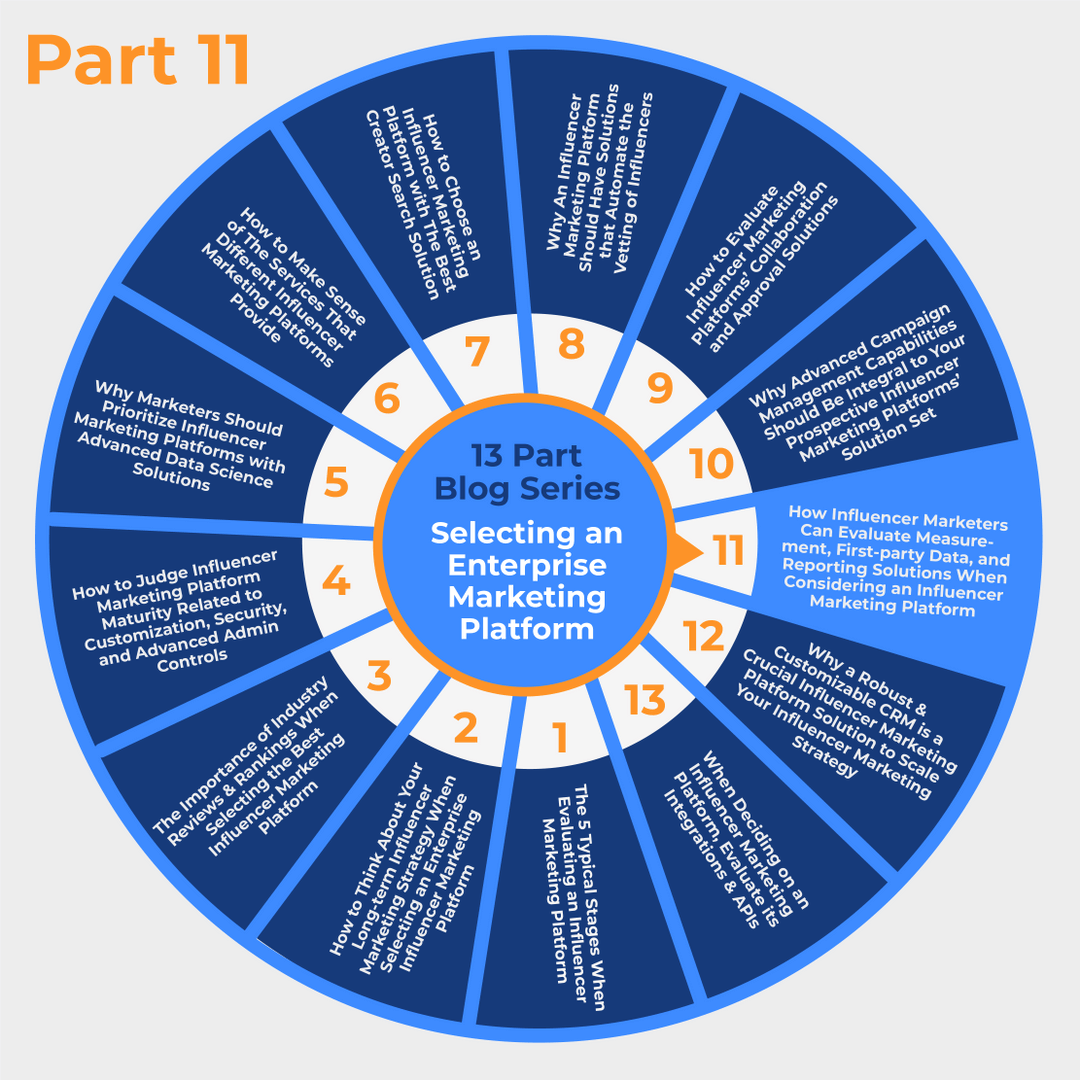Every marketer knows that even the most impressive campaigns become less impressive without measurable data to prove their success. Measuring performance and reporting to stakeholders is a critical step in every marketing strategy.
Download the Platform Buying Guide and Workbook
Many influencer marketing platforms have emerged to solve the problem of manual tracking of influencer campaigns, and making sense of the offerings has become complicated. The best influencer marketing platforms will focus on direct access to first-party influencer data, attribution, API connections, and customizable, shareable reports.
ROI and Attribution
Before centralized platforms emerged, tracking the ROI of influencer campaigns was one of the biggest challenges for marketers, and it remains one of the most important features to look for in a capable platform. Make sure that the platform you’re considering offers a full suite of customizable KPIs, including engagement rate, impressions, and reach with the ability to mature all the way to bottom-funnel metrics, such as click-through-rate, conversion tracking, and ROAS.
Influencer channel authentication, which provides direct access to an influencer’s owned data, will ensure the most accurate measurement and benchmarking. Once data is collected, make sure it’s portable through an API to connect to larger data sets and business intelligence (BI) platforms like Tableau.
Question to Ask:
- Be sure to ask about reporting customization & automation capabilities.
- Ask if the reporting allows for proper measurement of ROAS for both organic and paid content.
Paid and Organic Content Tracking
As brands continue to merge influencer marketing with paid media strategies, it’s important for a platform to measure and report both organic and paid (i.e. promoted) content. Be sure to ask if the platform’s data engine has the capability to adapt as promoted content strategies evolve with social media platforms and their increasing emphasis on first-party sales attribution.
Custom Reports
Once you’ve set up proper measurement parameters with custom metrics, you should be able to generate beautiful reports and share them with your team and stakeholders internally and externally. Customization capabilities should allow you to brand or white label your reports and presentations to eliminate the need to create manual reports using third-party software. The option to template your reports will also simplify future reporting and ensure consistency.
Pro Tips:
- Some platforms offer dynamic, shareable dashboards that update in real-time. Some platforms also provide templated, automated PowerPoint, and PDF presentation generation, i.e., beautiful reports with a single click.
- It’s vital to ensure that the platform streamlines channel authentication, as this will be an essential tool in the future that drives first-party data ownership.
With so many variables to consider, it’s helpful to create a checklist of the measurement and reporting features you need within an influencer marketing platform. For inspiration, download the CreatorIQ checklist template here.
The Takeaway
Measuring and reporting on the successes and failures of influencer marketing campaigns has historically been one of the biggest hurdles for marketers to overcome when implementing influencer strategies into their marketing mixes. This has led to many platforms aiming to take inefficient manual reporting out of the process. The right influencer marketing platform will offer the most comprehensive data sets and reporting capabilities through direct APIs and access to influencer profile data and metrics, complete with a fully customizable suite of trackable KPIs.
There are several other things to consider when choosing an influencer marketing platform. Our next blog post will discuss why a robust and customizable CRM is a crucial influencer marketing platform solution to scale your influencer marketing strategy. Get the complete Guide & Workbook for Selecting an Enterprise Influencer Marketing Platform or stay tuned for the next post.
Be sure to catch up on the rest of our 13-part series dedicated to helping you find the right influencer marketing platform with the directory below.
Selecting an Enterprise Marketing Platform
13 Part Blog Series
- The 5 Typical Stages When Evaluating an Influencer Marketing Platform
- Thinking about Your Long-term Influencer Marketing Strategy
- The Importance of Industry Reviews & Rankings When Selecting the Best Influencer Marketing Platform
- How to Judge Influencer Marketing Platform Maturity Related to Customization, Security, and Advanced Admin Controls
- Why Marketers Should Prioritize Influencer Marketing Platforms with Advanced Data Science Solutions
- How to Make Sense of The Services That Different Influencer Marketing Platforms Provide
- How to Choose an Influencer Marketing Platform with The Best Creator Search Solution
- Why An Influencer Marketing Platform Should Have Solutions that Automate the Vetting of Influencers
- How to Evaluate Influencer Marketing Platforms’ Collaboration and Approval Solutions
- Why Advanced Campaign Management Capabilities Should Be Integral to Your Prospective Influencer Marketing Platforms’ Solution Set
- How Influencer Marketers Can Evaluate Measurement, First-party Data, and Reporting Solutions When Considering an Influencer Marketing Platform
- Why a Robust & Customizable CRM is a Crucial Influencer Marketing Platform Solution to Scale Your Influencer Marketing Strategy
- When Deciding on an Influencer Marketing Platform, Evaluate its Integrations & APIs

